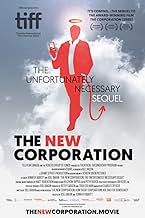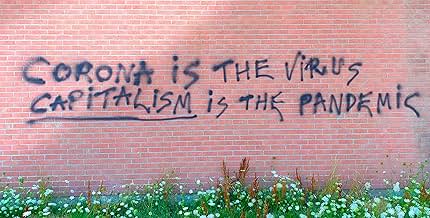A Nova Corporação
Título original: The New Corporation: The Unfortunately Necessary Sequel
AVALIAÇÃO DA IMDb
7,0/10
731
SUA AVALIAÇÃO
Expõe como as corporações estão desesperadamente se rebatizando como socialmente responsáveis, e como isso ameaça as liberdades democráticas.Expõe como as corporações estão desesperadamente se rebatizando como socialmente responsáveis, e como isso ameaça as liberdades democráticas.Expõe como as corporações estão desesperadamente se rebatizando como socialmente responsáveis, e como isso ameaça as liberdades democráticas.
- Direção
- Roteirista
- Artistas
- Prêmios
- 1 vitória e 8 indicações no total
Avaliações em destaque
I'm amazed by the number of reviewers who were surprised to find "socialist" or "left-leaning" commentators being interviewed for this documentary--especially those reviewers who mention the original documentary favorably. Since the thesis of the documentary is (essentially) that corporations are dangerous, I'm not sure who else they expected to be interviewed. The film features some of the same interviewees from the first film: Robert Reich, Naomi Klein, Noam Chomsky, Vandana Shiva, and so on. It does also feature a couple corporate representatives, but not the number that were featured in the longer and more in-depth first documentary.
As the film indicates with clips from Margaret Thatcher, Ronald Reagan and Milton Friedman, since the 1970's, a market-based neoliberal philosophy has come to dominate political dialogue to the point that de-regulation is a central mantra of conservatives the world over (not to mention most centrist liberals). I would challenge these reviewers who demand a more "fair and balanced" presentation to scour the internet for a mainstream right-wing politician, thinker or activist that is strongly against corporate consolidation of power. You won't find one. It would be difficult, but not impossible, do do so within the mainstream centrists (Democrats in the US, or liberal parties in other countries), as well.
On the other hand, if the demand is to present these interviews alongside those who speak on behalf of the corporation, we certainly don't need further examples of that: our lives are inundated with constant pro-corporate messages, whether explicitly in advertising, or implicitly in the various privatized systems we have to navigate on an everyday basis--you are reading this review on a website that has been owned by Amazon since 1998. The pro-corporate perspective is also represented in the first film, which is more broadly about the history of corporations and their general methods of operation; this "sequel" feels more like an addendum or appendix than something to be viewed in a vacuum. In other words, if you haven't seen the first film, you should watch that first, as it is certainly still relevant and revealing.
Chris Hedges is correct that it is hard to view the complex of issues presented currently without feeling a deep sense of despair. I think that is why the second half of the film, which I see here derided by others, is both important, and ironically the subject of such angst. We are at an impasse and many of us feel powerless to counteract global forces that seem to be spiraling toward inevitable destruction. To present this documentary without some iota of hope would not only be depressing, it would be irresponsible. In the internet age, where raising someone's ire is the surest way to generate traffic, and therefore revenue, we should take at least some time to focus on the causes that bring us together, not just the ones that piss us all off.
As the film indicates with clips from Margaret Thatcher, Ronald Reagan and Milton Friedman, since the 1970's, a market-based neoliberal philosophy has come to dominate political dialogue to the point that de-regulation is a central mantra of conservatives the world over (not to mention most centrist liberals). I would challenge these reviewers who demand a more "fair and balanced" presentation to scour the internet for a mainstream right-wing politician, thinker or activist that is strongly against corporate consolidation of power. You won't find one. It would be difficult, but not impossible, do do so within the mainstream centrists (Democrats in the US, or liberal parties in other countries), as well.
On the other hand, if the demand is to present these interviews alongside those who speak on behalf of the corporation, we certainly don't need further examples of that: our lives are inundated with constant pro-corporate messages, whether explicitly in advertising, or implicitly in the various privatized systems we have to navigate on an everyday basis--you are reading this review on a website that has been owned by Amazon since 1998. The pro-corporate perspective is also represented in the first film, which is more broadly about the history of corporations and their general methods of operation; this "sequel" feels more like an addendum or appendix than something to be viewed in a vacuum. In other words, if you haven't seen the first film, you should watch that first, as it is certainly still relevant and revealing.
Chris Hedges is correct that it is hard to view the complex of issues presented currently without feeling a deep sense of despair. I think that is why the second half of the film, which I see here derided by others, is both important, and ironically the subject of such angst. We are at an impasse and many of us feel powerless to counteract global forces that seem to be spiraling toward inevitable destruction. To present this documentary without some iota of hope would not only be depressing, it would be irresponsible. In the internet age, where raising someone's ire is the surest way to generate traffic, and therefore revenue, we should take at least some time to focus on the causes that bring us together, not just the ones that piss us all off.
This is a well-produced documentary that starts off quite informatively by calling out how corporations use various methods to reinforce the narrative that they are socially responsible and helping the planet while simultaneously putting profits before anything. Great point made about how banks (JP Morgan is called out specifically) responsible for the 2008 crisis fancied themselves as "saviours" in the fallout by investing in a place like Detroit, where they stand to make a bundle either way. It also makes good points about corporate tax evasion and influence of their money in politics.
It really only tells one side of the story in most cases it studies however, which is a strongly socialist perspective. I'm not saying that's wrong as I myself support certain socialist ideas, but it's worth noting the politics of those being interviewed is overwhelmingly left-wing. As a result, it's more of a one-sided conversation, which is quite disappointing and a bit preachy to the viewer. As with any contemporary media these days, it also had to throw in a jab at Trump supporters because apparently they all support corporate greed and blame their struggles on minorities.
My biggest qualm is that in the last half or so it jumps from topic to topic, mostly socialist talking points, that are essentially unrelated to corporations aside from the Australian coal company. It's like I was watching a completely different documentary and it felt more like disorganized propaganda at that point.
First half, 7.5/10. Second half, 3/10. I really wish they would have gone into more depth on a couple of topics as opposed to just briefly giving left-leaning viewpoints on a cherry-picked assortment of social, economic, and political topics. It was reasonably interesting overall though, so it gets a 6.
It really only tells one side of the story in most cases it studies however, which is a strongly socialist perspective. I'm not saying that's wrong as I myself support certain socialist ideas, but it's worth noting the politics of those being interviewed is overwhelmingly left-wing. As a result, it's more of a one-sided conversation, which is quite disappointing and a bit preachy to the viewer. As with any contemporary media these days, it also had to throw in a jab at Trump supporters because apparently they all support corporate greed and blame their struggles on minorities.
My biggest qualm is that in the last half or so it jumps from topic to topic, mostly socialist talking points, that are essentially unrelated to corporations aside from the Australian coal company. It's like I was watching a completely different documentary and it felt more like disorganized propaganda at that point.
First half, 7.5/10. Second half, 3/10. I really wish they would have gone into more depth on a couple of topics as opposed to just briefly giving left-leaning viewpoints on a cherry-picked assortment of social, economic, and political topics. It was reasonably interesting overall though, so it gets a 6.
If you want to now how we got here and the terrible road we're headed down, watch this. If you're blinded by ideology and don't come away with something, then you're a lost cause. If not, this should galvanize you at least somewhat.
Even though I'm totally on the capitalism-hating boundwagon, it's still hard to rate this film as a documentary regarding an unbiased, neutral look at a relative subject. Being essentially an open love letter to Bernie Sanders, Alexandria Ocasio-Cortez and all socialist activists in the west world, and likewise zealously bashing and pounding on Amazon, Facebook, Google, etc, this film shouldn't be sorted as a documentary.
How this film works, however, is regarded as an essay film which theorises certain attributes towards the "giant" corporations and their devastating and deadly effects on the present world, just "for a few dollars more". In this standpoint, the film is a wholesome and comprehensive work for it points out several pitfalls and valid issues within those corporations, builds up a hypothesis to generalize their conducts, and in the final third part arrives at a fully fleshed-out solution.
If you are looking for a documentary presenting or representing facts and realities, then this film is likely to disappoint. But if you are looking for a totally biased explanation and analysis of our modern universe, then this is definitely something to consider.
How this film works, however, is regarded as an essay film which theorises certain attributes towards the "giant" corporations and their devastating and deadly effects on the present world, just "for a few dollars more". In this standpoint, the film is a wholesome and comprehensive work for it points out several pitfalls and valid issues within those corporations, builds up a hypothesis to generalize their conducts, and in the final third part arrives at a fully fleshed-out solution.
If you are looking for a documentary presenting or representing facts and realities, then this film is likely to disappoint. But if you are looking for a totally biased explanation and analysis of our modern universe, then this is definitely something to consider.
I don't normally write feedback on fake reviews but these are so obvious its not funny. To name democrats and in particular to call "Kshama Sawant a socialist, but an evil one at that"...... is ridiculous. A right wing opinion that brings politics into a review of a movie/documentary is not right.
Now I will watch this and review it properly.
Now I will watch this and review it properly.
Você sabia?
- CuriosidadesThis program documentary was funded by the biggest media corporation in Canada
- ConexõesFollows The Corporation (2003)
Principais escolhas
Faça login para avaliar e ver a lista de recomendações personalizadas
- How long is The New Corporation: The Unfortunately Necessary Sequel?Fornecido pela Alexa
Detalhes
- Data de lançamento
- País de origem
- Centrais de atendimento oficiais
- Idioma
- Também conhecido como
- The New Corporation: The Unfortunately Necessary Sequel
- Locações de filme
- Empresas de produção
- Consulte mais créditos da empresa na IMDbPro
- Tempo de duração1 hora 45 minutos
- Proporção
- 16:9 HD
Contribua para esta página
Sugerir uma alteração ou adicionar conteúdo ausente

Principal brecha
By what name was A Nova Corporação (2020) officially released in India in English?
Responda


















